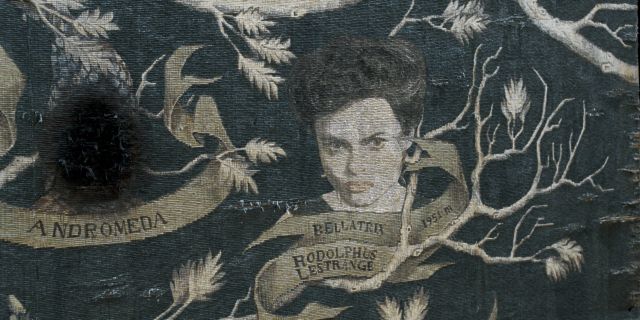Quick Links
- Who Are Blood Traitors in Harry Potter?
- Why Are the Weasleys Considered Blood Traitors?
For generations, many of the elitist pure-blood wizards and witches in Harry Potter have valued undiluted magical heritage; they believe that one’s magical abilities are solely dependent on the purity of their blood (i.e. they have no Muggle roots). These inherited beliefs have given rise to intolerance towards ‘unworthy’ individuals: half-bloods, who have at least one Muggle parent or grandparent; Muggle-borns or “the other sort”, who have been raised by Muggles; and Squibs, who cannot perform magic despite belonging to wizarding families. Anyone who disputes this flawed structure is considered a traitor to their own kind — or a ‘blood traitor’.
Although the origins of this label are unknown, the portrait of Mrs. Black is first heard using it in the fifth book of Harry Potter (“Blood traitor, abomination, shame of my flesh!”). Like her, the proponents of blood purity find it offensive when blood traitors seemingly do not care about their lineage — which is why many of them support Voldemort during both wizarding wars.
RELATED: Harry Potter: What Is the Relationship Between Wizards and Muggles Like?
Who Are Blood Traitors in Harry Potter?

The term ‘blood traitor’, in simple words, applies to any wizard or witch (especially a pure-blood) who does not harbor any prejudice against the non-magical community, and even fraternizes with them. Similar terms include ‘Muggle-lover’, ‘Mudblood-lover’ or, according to The Tales of Beedle the Bard, ‘Dunglicker’, ’Scumsucker’, and ‘Mudwallower’. As those with pure-blood consciousness regard Muggle-borns and Muggles as ‘dirty’ and inferior, blood traitors are also considered ‘filthy’ by extension. As Bellatrix Lestrange says:
Blood traitor is next to Mudblood in my book.
Anyone who sympathizes with non-pure-bloods — and renounces their family in the process — is also literally burned off the family tree tapestry (as Sirius Black discovers while examining his family tree). Rejecting the doctrine of blood purity or openly supporting equal rights also becomes punishable by law in Harry Potter and the Deathly Hallows, which causes the accused blood traitors to go on the run as well.
The earliest known blood traitors are probably the founders of Hogwarts who rejected Salazar Slytherin’s biased beliefs. Another prominent blood traitor in wizarding history was the activist Carlotta Pinkstone, who performed magic in front of Muggles as she believed that they should be aware of it.
Albus Dumbledore, the “champion of commoners, of Mudbloods and Muggles”, is also a notable example. Although he was also once biased towards the latter, he redeems himself by spending the rest of his life fighting for their rights. He establishes the Order of the Phoenix for this very purpose, the members of which oppose blood status. Among them is Sirius, who is also disowned for defying his long-standing family values (“My parents, with their pure-blood mania, convinced that to be a Black made you practically royal…”). Charity Burbage, the Professor of Muggle Studies at Hogwarts, also upholds Muggle rights — for which she is eventually killed by Voldemort.
Characters who have been called blood traitors just for their close association with Muggles or those of non-pure-blood descent include Andromeda Tonks, who married a Muggle-born (Ted Tonks), and was shunned by her sisters, Bellatrix and Narcissa Malfoy, for doing so. Dean Thomas’ father is another example: he originally married a Muggle woman, but had to leave her and Dean during the First Wizarding War to protect them from Death Eaters. The Potter family also falls under this category, as James not only married the Muggle-born Lily Evans, but also joined the Order to oppose Voldemort’s ideology. Like Harry, Neville is also considered a traitor to the pure race for supporting the Order’s cause (as his parents did). Even Marvolo Gaunt called his daughter Merope a blood traitor simply for admiring Tom Riddle Sr., a Muggle, from afar.
Why Are the Weasleys Considered Blood Traitors?

An anonymous author published a book in the 1930s, titled The Pure-Blood Directory, which listed the original pure-blood families (the Sacred Twenty-Eight) in an effort to preserve their bloodlines. A select few publicly disapproved of their inclusion in the publication, declaring that they were related to Muggles and were not ashamed of that fact. As J. K. Rowling writes:
Most vocally indignant was the numerous Weasley family, which, in spite of its connections with almost every old wizarding family in Britain, was proud of its ancestral ties to many interesting Muggles. Their protests earned these families the opprobrium of advocates of the pure-blood doctrine, and the epithet ‘blood traitor’.
The Weasleys’ pro-Muggle sentiments are made clear since the beginning of the series, because of which Draco Malfoy calls them an “embarrassment” to the wizarding world: “You’d never know the Weasleys were pure-bloods, the way they behave.” They willingly socialize with Muggles, Muggle-borns and other blood traitors, and also join the Order.
Moreover, Arthur Weasley is known for his fascination with Muggles — in fact, he initially works in the Misuse of Muggle Artifacts Office due to his fondness for Muggle inventions. Even Cornelius Fudge tends to overlook him because of his ‘unusual’ interests. He also has the following exchange with the pure-blood supremacist Lucius Malfoy:
Lucius: What’s the use of being a disgrace to the name of wizard if they don’t even pay you well for it?
Arthur: We have a very different idea of what disgraces the name of wizard, Malfoy.
When Voldemort temporarily takes over the Ministry of Magic, the Weasleys are kept under close surveillance due to their anti-purity ideology. As Sirius also tells Harry, “[…] if ever a family was a bunch of blood traitors it’s the Weasleys.”











Leave a Reply